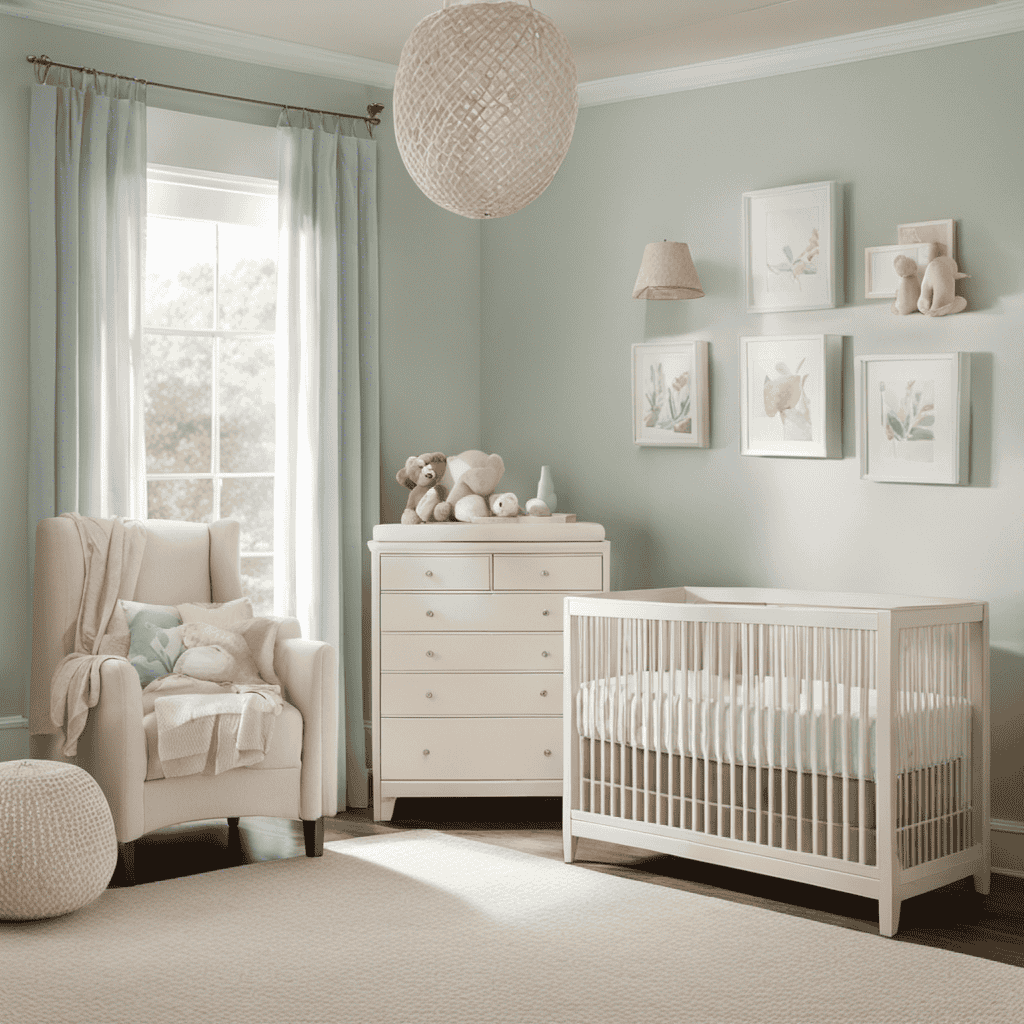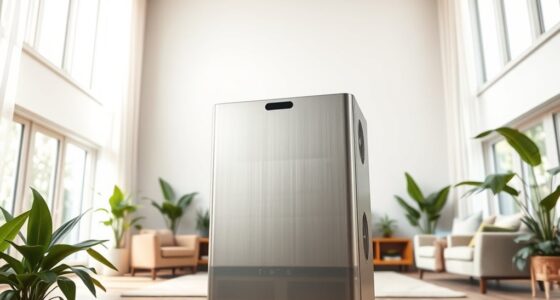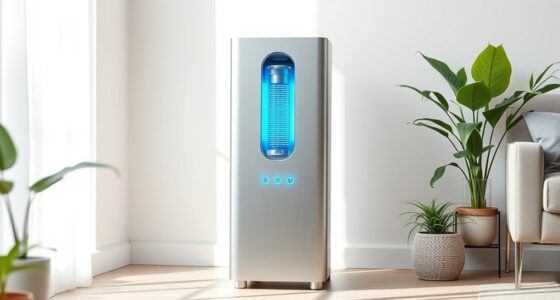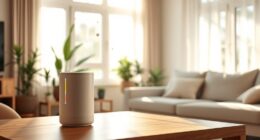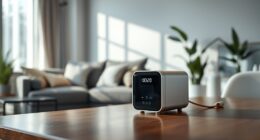As a guardian, I am fully aware of the struggles involved when your child suffers from intense allergies. It’s essential to discover the ideal air purifier that can help lessen their discomfort.
In this article, we will explore different types of air purifiers and discuss the features to look for. We will also delve into how air purifiers can help with allergies and provide a list of the top options available.
Stay tuned for valuable tips on choosing the best air purifier for your child’s needs.
Key Takeaways
- HEPA filters effectively remove allergens, such as pollen, dust mites, pet dander, and mold spores.
- Air purifiers can improve indoor air quality and reduce the frequency and severity of allergy attacks.
- Consideration of top air purifiers for severe allergies, including Dyson Pure Cool TP04, Winix 5500-2, and Coway AP-1512HH.
- When choosing an air purifier for a child with severe allergies, factors to consider include filter effectiveness, noise level, budget-friendly options, and additional features like size and coverage area.
Different Types of Air Purifiers
When it comes to choosing an air purifier, you should consider the different types available.
Portable air purifiers are a popular choice, as they can be easily moved from room to room to provide clean air wherever you need it. These purifiers typically use filters to capture and remove allergens, such as pet dander, from the air.
If you or your child suffers from pet allergies, an air purifier specifically designed for this purpose can be highly effective in reducing symptoms. These purifiers often feature specialized filters that can capture even the smallest particles of pet allergens.
Understanding the different types of air purifiers available and their specific benefits can help you make an informed decision when selecting the best option for your family’s needs.
Understanding Severe Allergies in Children
To understand severe allergies in children, you should educate yourself about the triggers and symptoms. Here are some important points to consider:
- Common allergens include pollen, dust mites, pet dander, mold spores, and certain foods.
- Allergy triggers can vary from person to person, but exposure to these allergens can cause symptoms such as sneezing, coughing, itching, and difficulty breathing.
- It’s crucial to identify the specific allergens that affect your child, as this will help you take appropriate measures to minimize their exposure.
- Regular cleaning of your home, using allergen-proof bedding, and keeping pets out of your child’s bedroom can help reduce allergen exposure.
- Consult with an allergist to determine the best course of action and to develop an allergy management plan.
Understanding your child’s allergies is the first step towards finding the best air purifier to help alleviate their symptoms.
Features to Look for in an Air Purifier
When it comes to choosing an air purifier, there are a few key features to consider.
One of the most important factors is effective filtration technology, which ensures that the purifier can effectively remove allergens and pollutants from the air.
This is especially crucial for those with severe allergies, as it can help create a cleaner and healthier living environment.
Effective Filtration Technology
One option for effective filtration technology is an air purifier with a HEPA filter. HEPA stands for High Efficiency Particulate Air, and these filters are designed to remove 99.97% of particles as small as 0.3 microns from the air.
Here are some key features of air purifiers with HEPA filters that contribute to advanced technology and air quality improvement:
- Multi-layered filtration system for capturing various pollutants
- Activated carbon filters for reducing odors and harmful gases
- UV-C light technology for killing bacteria and viruses
- Smart sensors to detect air quality and adjust filtration speed accordingly
- Quiet operation for undisturbed use, even while sleeping
With these advanced features, air purifiers with HEPA filters provide an effective solution for improving indoor air quality.
Now, let’s delve into the next section about allergen and pollutant removal.
Allergen and Pollutant Removal
You can effectively remove allergens and pollutants from your indoor air by using an air purifier with a HEPA filter. Air purifiers with HEPA filters are designed to capture and trap tiny particles in the air, including pollen, pet dander, dust mites, and mold spores. By removing these allergens, air purifiers can greatly benefit individuals with allergies, asthma, or other respiratory conditions.
In addition to reducing allergy symptoms, clean air provided by air purifiers can also improve overall health and well-being. Breathing in clean air can help reduce the risk of respiratory infections, improve sleep quality, and enhance cognitive function.
With the numerous benefits of clean air, investing in an air purifier with a HEPA filter is a wise decision for anyone looking to improve their indoor air quality and overall health.
And now, let’s explore how air purifiers specifically help with allergies.
How Air Purifiers Help With Allergies
An air purifier can significantly reduce allergy symptoms by filtering out allergens from the air. It is a great investment for anyone suffering from allergies, especially if they have severe symptoms. Here are a few benefits of using an air purifier to reduce allergy symptoms:
- Removes allergens such as pollen, dust mites, pet dander, and mold spores from the air.
- Improves indoor air quality, creating a healthier environment for allergy sufferers.
- Reduces the frequency and severity of allergy attacks.
- Provides relief from common allergy symptoms like sneezing, coughing, and itchy eyes.
- Helps individuals with respiratory conditions like asthma breathe easier.
Research has shown that air purifiers can effectively reduce allergens in the air, leading to a decrease in allergy symptoms. By incorporating an air purifier into your home or office, you can create a clean and allergen-free environment, providing much-needed relief from allergies.
Top Air Purifiers for Severe Allergies
If you’re dealing with severe allergies, it’s essential to find a high-quality air purifier that effectively removes allergens from the air.
When it comes to the best air purifiers for allergy relief, there are a few top options to consider.
One of the top choices is the Dyson Pure Cool TP04. It uses a combination of HEPA and activated carbon filters to capture particles as small as 0.3 microns, including allergens like pollen, dust mites, and pet dander.
Another great option is the Winix 5500-2. It features a true HEPA filter and PlasmaWave technology to remove allergens and neutralize odors.
Lastly, the Coway AP-1512HH is highly recommended. It has a four-stage filtration system that effectively eliminates allergens and has an auto mode to adjust the fan speed based on air quality.
These air purifiers provide excellent allergy relief options for those with severe allergies.
Tips for Choosing the Best Air Purifier for Your Child
When it comes to choosing the best air purifier for your child, there are several key points to consider.
First, filter effectiveness comparisons are essential in determining how well the purifier can remove allergens and pollutants from the air.
Secondly, noise level considerations are important, as you want a purifier that won’t disrupt your child’s sleep or activities.
Lastly, it’s worth exploring budget-friendly options available to ensure that you find an effective purifier that fits within your financial means.
Filter Effectiveness Comparisons
You should consider the filter effectiveness comparisons when choosing the best air purifier for your son’s severe allergies. The market is flooded with various air purifier brands, each claiming to be the best. However, relying solely on marketing hype may not be the most reliable approach. It is essential to look at customer reviews and compare the filter effectiveness of different models.
Here are some factors to consider:
-
HEPA filters: Look for air purifiers with High-Efficiency Particulate Air (HEPA) filters, as they are proven to capture 99.97% of particles as small as 0.3 microns.
-
Activated carbon filters: These filters help eliminate odors and harmful gases, making them beneficial for allergy sufferers.
-
Pre-filters: These capture larger particles like dust and pet dander, extending the life of the main filter.
-
CADR ratings: Check the Clean Air Delivery Rate (CADR) ratings, which indicate the purifier’s effectiveness in removing smoke, pollen, and dust.
-
Filter replacement: Consider the cost and frequency of filter replacements.
Considering these factors will help you find an air purifier that effectively filters allergens and provides relief for your son’s allergies.
Now let’s discuss noise level considerations.
Noise Level Considerations
The noise level of the air purifier is an important consideration when choosing the right model for your needs. You want a purifier that operates quietly, so it doesn’t disturb your peace or sleep. Look for models with a low noise level rating, usually measured in decibels (dB).
A noise level of around 30-40 dB is considered quiet and won’t cause any disruption.
In addition to quiet operation, it’s also important to consider energy efficiency. Look for air purifiers that are Energy Star certified, as they are designed to consume less energy while still providing effective purification. These models can help you save on your energy bills while keeping your indoor air clean and fresh.
Budget-Friendly Options Available
Looking for a cost-effective option? Consider checking out some of the budget-friendly air purifiers available on the market. When it comes to finding the best air purifier for my son’s severe allergies, affordability is definitely a factor to consider.
Here are some affordable options and the best air purifier brands to look out for:
-
Honeywell: Known for their quality and affordability, Honeywell offers a range of air purifiers that can effectively remove allergens from the air.
-
Levoit: With their advanced filtration systems, Levoit air purifiers are highly recommended for those with allergies.
-
GermGuardian: This brand offers affordable air purifiers with HEPA filters that capture 99.97% of allergens.
-
Winix: Winix air purifiers are known for their affordability and effective air cleaning capabilities.
-
Coway: Coway air purifiers are not only budget-friendly but also have excellent performance in removing allergens.
These affordable options from top air purifier brands can help improve indoor air quality without breaking the bank.
Which Air Purifier is Most Effective for Severe Allergies in Children?
When it comes to dealing with severe allergies in children, finding the best air purifier for allergies is crucial. Look for a purifier with HEPA filters, as they can remove tiny allergens from the air. Also, consider purifiers with activated carbon filters to eliminate odors and VOCs.
Frequently Asked Questions
How Often Should I Clean or Replace the Filters in an Air Purifier?
I clean or replace the filters in my air purifier every 3 to 6 months. Regular maintenance ensures optimal performance and helps remove allergens, pollutants, and other particles, benefiting overall health.
Can an Air Purifier Completely Eliminate Allergens From the Air?
Air purifiers can effectively remove pet allergens, dust mites, and mold spores from the air. They are safe for pets, but it’s important to choose one with a HEPA filter for optimal results.
Are There Any Specific Air Purifier Brands That Are Recommended for Children With Severe Allergies?
The best air purifier brand for children with severe allergies is subjective, as it depends on individual needs. However, some reputable brands known for their effectiveness in removing allergens are Honeywell, Blueair, and Coway.
Can an Air Purifier Help With Allergy Symptoms Other Than Respiratory Issues, Such as Skin Rashes or Hives?
Yes, air purifiers can help improve symptoms of allergies beyond respiratory issues, like skin rashes or hives. Regularly cleaning or replacing the filters is necessary to ensure the air purifier functions effectively.
Are There Any Potential Side Effects or Risks Associated With Using an Air Purifier for Extended Periods of Time?
The potential benefits of using air purifiers for extended periods of time include improved indoor air quality and overall health. However, there may be drawbacks such as noise levels and the need for regular maintenance.
Conclusion
In conclusion, choosing the best air purifier for my son’s severe allergies was a daunting task.
However, after thorough research, I found that understanding the different types of purifiers and their features was crucial.
With the right air purifier, my son’s allergies can be greatly alleviated, allowing him to breathe easier and have a better quality of life.
So, why wait? Invest in the best air purifier today and give your child the relief they deserve.

